By Marine Protected Areas Team
To mark International MPA Day 2025, our Marine Protected Areas Team highlight the role JNCC has played over the past 10 years in marine nature conservation, and the value of Marine Protected Areas.
Marine Protected Areas (MPAs) are more than just conservation tools – they are lifelines for communities, biodiversity, and the planet. On this International MPA Day, we celebrate the global movement to effectively protect our ocean by 2030 and reflect on how awareness raising, community empowerment, and innovative collaboration are shaping a more sustainable future.
JNCC is an organisation working across marine and terrestrial environments, providing independent scientific advice to all four governments in the UK. JNCC also has a role working internationally through multiple projects across the world.
We have a vision of thriving nature for a sustainable future, by turning science into action for nature, people and the planet. From a marine perspective, we’re putting this into practice by contributing to the delivery of tangible and meaningful conservation outcomes from the work we do.
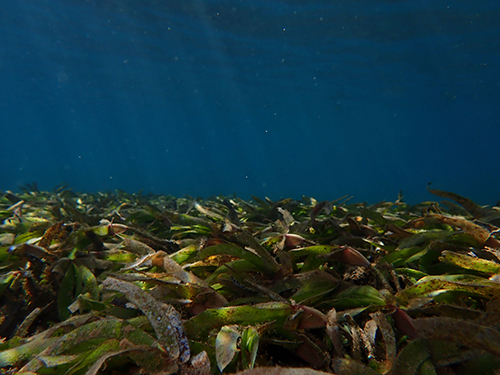
Image 1. Seagrass species Thalassodendron ciliatum below the water in Nosy Be, Madagascar (photo courtesy of Eirian Kettle).
We’ve been proud to support the UK Government-led Ocean Country Partnership Programme (OCPP), a UK Official Development Assistance funded programme under the Blue Planet Fund. The programme is delivered by JNCC alongside the Centre for Environment, Fisheries and Aquaculture Science (Cefas) and the Marine Management Organisation (MMO). Over the past five years, our work has spanned 11 countries, delivering technical assistance that strengthens marine governance, builds local capacity, and supports inclusive, sustainable livelihoods which are crucial for poverty alleviation.
We have been at the forefront of providing technical advice on the development of the UK MPA network for over ten years, and the UK is one of the leading global nations for coverage of MPAs within its national waters. We also play an important role in co-ordinating the different MPA programmes across the four countries of the UK.
Communities at the cornerstone of MPA success
MPAs thrive when communities are informed, engaged and involved at all stages of the MPA implementation process. OCPP works alongside country governments and local organisations to ensure that valuable and unique local expertise is retained and applied but also form part of the future and ongoing monitoring and management of the MPA network in each country. In Ghana, we have supported the development of a roadmap for MPA implementation, grounded in giving significant value to local knowledge and participatory research.
Empowering local stakeholders is central to our approach. In the Maldives, we have supported the development of a national MPA Management Framework and trained over 20 stakeholders in management effectiveness assessments. A national MPA Forum brought together 85 participants – many for the first time – fostering new networks and shared learning in pursuit of innovative collaboration.
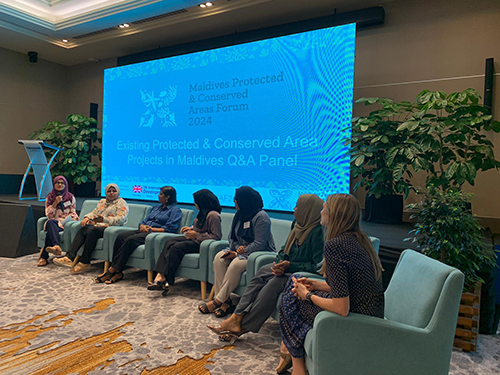
Image 2: A group of professionals come together for a Q&A panel at the Maldives Protected & Conserved Areas Forum 2024 (photo courtesy of Jamie Small).
In Sri Lanka, OCPP worked with local organisations to lead community workshops and raise awareness of the importance of protected, endangered and threatened (PET) marine species. The workshops taught coastal communities about PET species found in Sri Lanka, increasing local knowledge and showing the community how they can contribute to monitoring through citizen science data collection.
In Madagascar, our seagrass monitoring workshop equipped national park staff with practical field skills and conservation strategies, while in Senegal, we helped draft an Offshore MPA Framework through multilingual workshops and inter-ministerial collaboration so that they can extend their MPA network to meet 30x30 commitments. In Belize, we’ve helped strengthen marine data systems to support MPA expansion and meet Blue Bond commitments. Our work on Green Listing (under the global IUCN Green List Standard, a robust verification system which helps to measure successful conservation outcomes) is helping Belize demonstrate that its MPAs meet international standards in conservation and equity.
Educating the next generation of practitioners
JNCC has played an active role in reaching out to secondary and tertiary education systems and year-on-year is involved in delivering various sessions at universities across the UK, linking to fisheries management, the monitoring of our MPAs and the MPA cycle.
Education and outreach help countries to build long-term understanding of the ecological and socio-economic benefits of MPAs. Through OCPP, we have developed and delivered short courses and training materials covering all stages of the MPA cycle; from site identification to designation, monitoring and management which can be delivered in OCPP countries for years to come. The OCCP also funds Master's and PhD scholarships for mid-career researchers from OCPP countries who wish to develop a career in marine science through the Association of Commonwealth Universities.
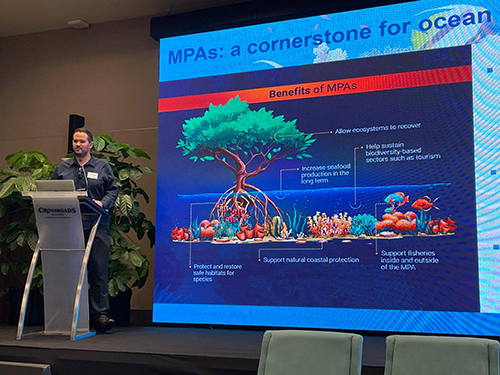
Image 3: The benefits of Marine Protected Areas are presented by a JNCC staff member during a technical visit to the Maldives (photo courtesy of Jamie Small).
We embody a Gender, Equality, Disability and Social Inclusion-sensitive approach wherever we can and aim to include disadvantaged or marginalised groups wherever possible. By working alongside universities and key stakeholders to reach and build capacity for the next generation of MPA managers and marine biologists we can ensure a secure future for global MPA networks.
Our focus on ocean literacy
Effective communication is the thread that connects our work across continents and communities. JNCC communicates our work in ocean conservation through our website, particularly via our site information centres for offshore UK MPAs, which provide key facts and photos on the sites.
In-country outreach materials, stakeholder strategies, and participatory workshops have helped build trust and understanding, ensuring that conservation efforts are locally relevant and inclusive.
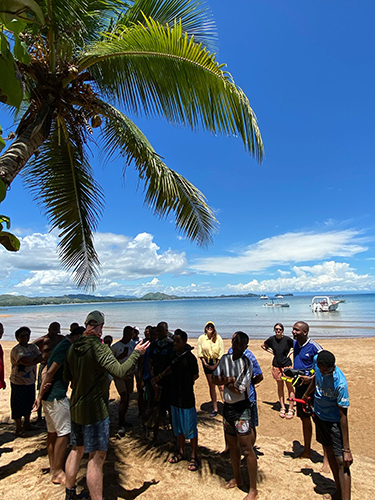
Image 4: Attendees of a seagrass monitoring workshop receiving a final briefing before putting their new skill to the test (photo courtesy of Eirian Kettle).
JNCC has worked closely with the Western Indian Ocean Marine Science Association to support Mozambique and Madagascar participation in regional capacity building and networking events, particularly through the Western Indian Ocean MPA Management Network (WIOMPAN). By ensuring Mozambique and Madagascar are represented in regional fora, JNCC is supporting peer-to-peer learning, knowledge exchange, and strengthening the WIOMPAN network. Mozambique and Madagascar partners are now more aware of, and able to access benefits from, mentoring and exchange opportunities, as well as training and certification events.
Innovative collaboration at a global scale
Innovative collaboration to tackle global problems, together, is the only solution to a sustainable future. JNCC is proud to lead the International Partnership on MPAs, Biodiversity and Climate Change, a group of government agencies from around the world who work together to build the evidence base around the role of MPAs in tackling the twin climate and biodiversity crises. Formally established in 2021, the International Partnership, with IUCN, has recently published the IUCN Report, Establishing MPAs in a Changing Climate. To read the report, find out more about the International Partnership or join us please contact us via The International Partnership on MPAs, Biodiversity and Climate Change website.
As the world works toward the Global Biodiversity Framework’s Target 3 – protecting 30% of the global ocean by 2030 – JNCC remains committed to supporting countries through expert-led, demand-driven delivery. Our work under OCPP has shown that when science, policy, and community come together, MPAs can deliver lasting impact.
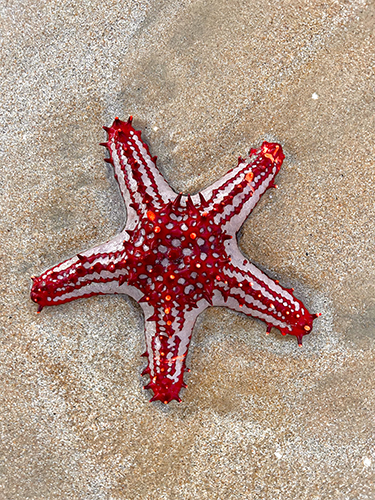
Image 5: A red-knobbed starfish (Protoreaster linckii) on the sand in Sri Lanka (photo courtesy of Holly Baigent).
JNCC is taking advantage of the wealth of marine environmental scientific understanding that has been developed over the last decade to examine protection measures in our seas through multiple lenses; from the food that we eat through to essential processes that regulate the global climate and the air that we breathe. For the first time, we will begin to assess our network of MPAs, not just from the perspective of tools for reversing and stemming marine biodiversity loss, but in the context of the role of these spatial protection measures for delivering wider services to society; notably within the context of food security and climate change.
Published:
